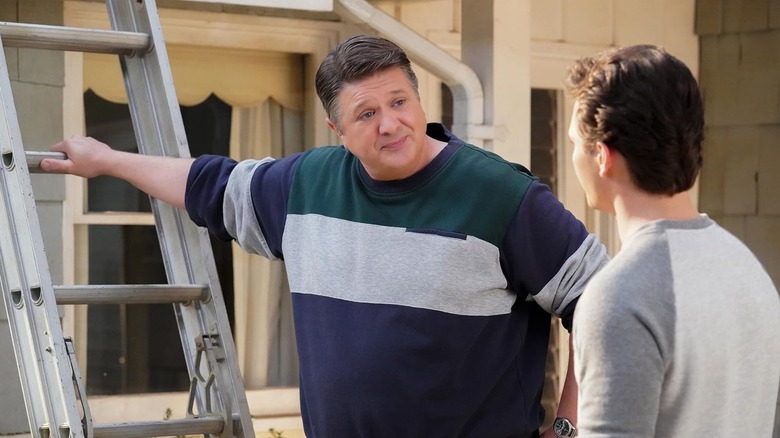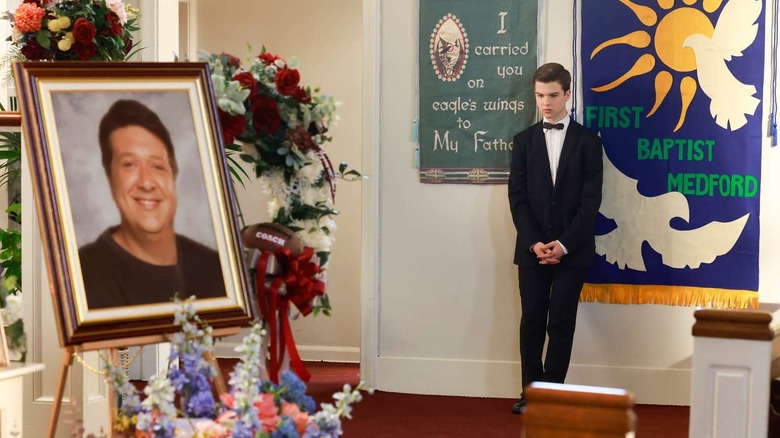“Younger Sheldon,” the “Large Bang Idea” spinoff that ran for seven seasons, is for essentially the most half a reasonably commonplace lighthearted community sitcom. The primary exception to this rule is that, because of all of the little bits of backstory we acquired of older Sheldon’s childhood on “The Large Bang Idea,” viewers knew that tragedy would ultimately strike the Cooper household. George Cooper Sr. (Lance Barber) would die in some unspecified time in the future in Sheldon’s youth, we simply did not know precisely how or why. (His explanation for dying was briefly listed on one in all Sheldon’s charts as “S.B.L,” no matter meaning.)
For seven seasons, then, the sword of Damocles hung over George Sr.’s head, and the foreboding was even worse as a result of “Younger Sheldon” portrayed George Sr. as being way more kindly than anticipated. Sheldon in “The Large Bang Idea” talks about his father as if he was a good-for-nothing drunk who cheated on his spouse and by no means cared for Sheldon, however all through “Younger Sheldon” George Sr. was portrayed as a reasonably good man. Yeah, he typically struggles to attach together with his nerdy, un-athletic son, however truthfully that is extra Sheldon’s fault for being annoying.
The inventive option to make George Sr. likable is certainly extra of a retcon than a real reflection on grownup Sheldon (who now seems to have needlessly disrespected his father’s reminiscence for 12 seasons straight), however it additionally made the spinoff collection’ remaining few episodes uniquely heavy for this form of sitcom. “Funeral,” the season 7 episode during which the youthful Sheldon (Iain Armitage) should navigate the aftermath of his father’s passing, is especially unhappy, all of the extra so as a result of it is an episode the present was just about obligated to do in some unspecified time in the future in its run. That is a part of why “Large Bang Idea” creator Chuck Lorre, who’d later go on to create “Younger Sheldon,” expressed some remorse for the flippantly-made determination to determine that Sheldon’s dad had died previous to the occasions of that present.
After season 7’s “A New Residence and a Conventional Texas Torture,” which ends with the Cooper household listening to the information of George Sr.’s dying, there was a self-importance card written by Lorre studying, “18 years in the past after we have been writing and producing ‘The Large Bang Idea,’ it appeared like a good suggestion to think about that Sheldon’s childhood was deeply disrupted by the lack of his father. Nobody may have thought that sometime we might remorse that call. That sometime is now.”
Lorre might remorse George Sr.’s dying, however the different showrunners do not
The cardboard continued, “There have been quite a lot of tears on stage when this episode’s final scene was shot. A reminder that we had all fallen in love with a fictional character. Which is, itself, a reminder to like the characters in our life who’re actual. To do in any other case is to stay with remorse.”
In an interview with Glamour printed to coincide with “Younger Sheldon” concluding in Could 2024, co-showrunners Steve Molaro and Steve Holland defined that they have been fairly completely happy in regards to the observe the collection ended on. “I feel it gave the present an actual robust emotional closure, and dying is so necessary to Sheldon as a personality,” mentioned Holland. “Trying again on that dying as an grownup has actually framed what this present’s been about, I feel.” Molaro added, “I agree. I do not remorse that it is taking place. It is a robust ending and part of life.”
The one actual subject was the incongruence with how George Sr. was portrayed in “The Large Bang Idea,” which “Younger Sheldon” partially addressed by way of a cameo by Jim Parsons because the older Sheldon within the collection finale. That scene did not fairly clarify the dissonance, particularly since Sheldon’s mom Mary additionally talks trash about George Sr. in “The Large Bang Idea” (the place she was performed by Laurie Metcalf), however Holland defined how that was a mandatory retcon to make the spinoff present work:
“As Chuck [Lorre] has at all times mentioned, you must give these exhibits room to develop and turn into their very own factor. You may’t drive them right into a field. Because the present went on, Lance introduced [so much] to the character. He was such a stunning individual and a lovable dad, and that was what the present was turning into. You may’t return and drive it into [something else]. It could’ve felt flawed for the character and the present.”
Maybe the very best factor about George Sr.’s dying is the best way it helps set “Younger Sheldon” other than its competitors. If not for this one large tragedy looming over the collection, “Younger Sheldon” would very a lot really feel like a regular community sitcom in an age the place sitcoms really feel much less related than ever. Sure, it is acquired the “Large Bang Idea” connection to assist it stick out, however George Sr.’s impending dying is the large tonal swing that the collection in all probability would not have taken if its dad or mum present hadn’t unwittingly pressured their hand. George Sr.’s canon dying meant that “Younger Sheldon” needed to be really daring in its remaining moments, and the result’s a present with probably the most attention-grabbing, well-received remaining seasons in recent times.

